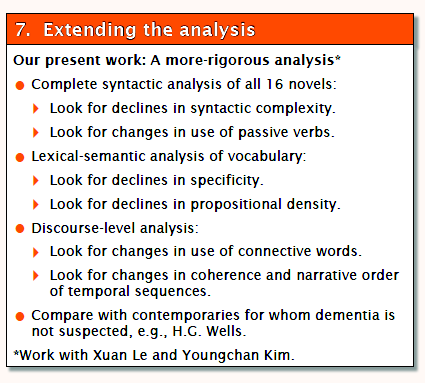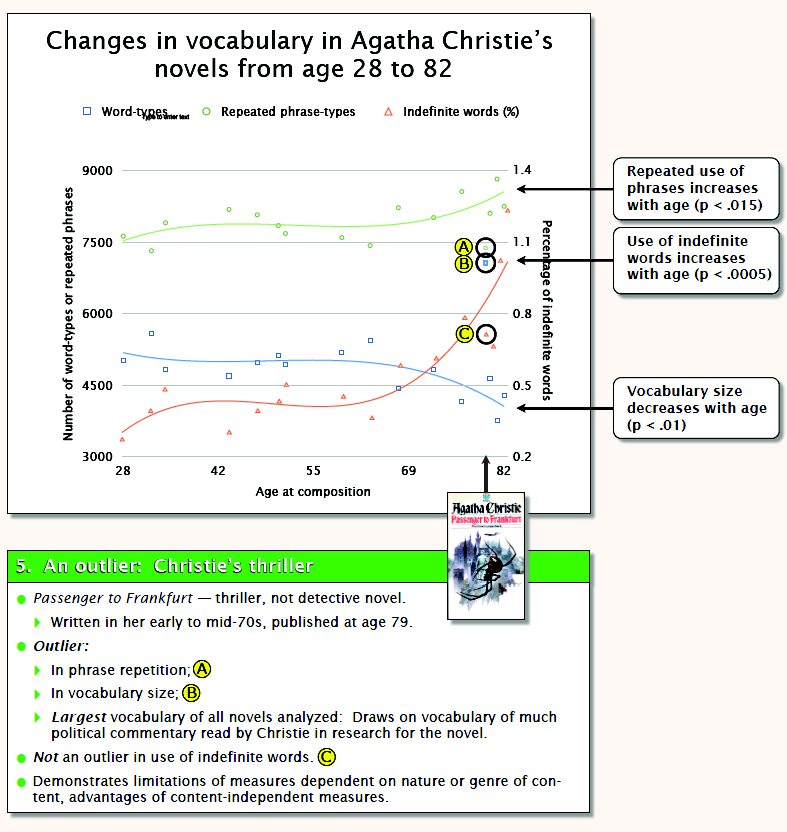Literary Alzheimer's
« previous post | next post »
One of the items featured in the New York Times Magazine's "Ninth Annual Year in Ideas", under the heading "Literary Alzheimer's", is a summary of Ian Lancashire and Graeme Hirst, "Vocabulary Changes in Agatha Christie’s Mysteries as an Indication of Dementia: A Case Study", presented at the 19th Annual Rotman Research Institute Conference, Cognitive Aging: Research and Practice, 8–10 March 2009, Toronto.
Their poster from that conference includes this graph summarizing their findings:
And this prospectus for future work:

Unlike the computational analysis of Christie's writing that we discussed a few years ago ("The Agatha Christie Code: Stylometry, serotonin and the oscillation overthruster", 12/26/2005; "The brave new world of computational neurolinguistics", 12/27/2005), Lancashire and Hirst's work was not part of a public-relations exercise on the part of a network promoting the movie versions of her novels. You should be able to tell the difference.

Literary Alzheimer’s. « Guns & Verbs said,
December 13, 2009 @ 6:33 pm
[…] 13, 2009 Interesting stuff on changes in Agatha Christie's writing as she aged over at Language Log. I've never much enjoyed Christie's work, but still found the post (and links) well […]
Jonathan Badger said,
December 13, 2009 @ 6:43 pm
There is the possibility of dementia, but there's also the simpler explanation that very successful authors may not put a lot of effort into their later works, as the books will sell well on name alone. How about trying it with Stephen King, Tom Clancy, and John Grisham?
[(myl) In Agatha Christie's case, she was a famous author by 1926, when she was in her mid-thirties, to the point that her disappearance following the discovery of her husband's infidelity achieved Tiger Woods levels of public attention. The change in her writing style, as the graph above shows, didn't take place until she was in her 70s, 30-odd years and dozens of books later. So slacking off as a result of success is not a plausible theory.]
Andrew (not the same one) said,
December 13, 2009 @ 7:05 pm
Well, they are planning to do comparisons which would check for this – with P.D. James, who is known to be healthy, and with an author known to have had dementia.
There's widely thought to have been a falling-off of Christie's quality from the 1950's onwards, which may very plausibly be explained in the way you suggest, but the decline in her last couple of books is different in nature; the idea that it was caused by dementia looks very probable to me.
Doctor Science said,
December 13, 2009 @ 7:55 pm
I'm glad they're doing comparisons with other authors, because there is definitely a widespread "I don't feel like writing anything, but there's this contract" disease that afflicts many best-selling writers.
It was my assumption at the time (when Christie's last books were coming out) that she was not actually writing them — I figured they were being cobbled together from her notes by hired hacks. She wouldn't have been the first.
If they can come up with a scientific explanation for the downward trajectory of the Dune novels, I would be very grateful. It has been described as "like watching Frank Herbert unlearn to write."
Chris said,
December 13, 2009 @ 8:44 pm
Very interesting! I just posted about somewhat related research: the fact that all authors seem to repeat vocabulary more as they write larger works (see here ). However, the research I reported on did not take age into account. Rather, they simply found that vocabulary repetition was a function of corpus size. A weird result, btw; nonetheless, factoring in age may have an interesting effect.
J Greely said,
December 13, 2009 @ 9:12 pm
The link to the paper says they used published novels as their source. I see no mention of an attempt to account for changes introduced by her editors, or to control for the "cranky old famous writer insists that you leave her prose alone dammit" factor.
-j
Eveline said,
December 13, 2009 @ 9:40 pm
Perhaps the "staggering drop in vocabulary" found in Christie's 'Elephants Can Remember' ( written when she was 81 ) merely reflects the contempt she felt toward her own creation, Poirot. She referred to him in an interview as "detestable" and a "little creep". She longed to kill him off during her lifetime but he was too commercially successful. So how much effort would a writer in her declining years ( dementia or no dementia ) be expected to put into a work featuring a character she despised?
Mark F. said,
December 13, 2009 @ 11:51 pm
I looked at the paper briefly. The authors aren't claiming to infer dementia solely from her writing. She was already thought to have some level of dementia, just based on observations by those close to her. The point of the paper is to see if this already-known likely dementia manifested itself in measurable traits in her writing.
J. Goard said,
December 14, 2009 @ 2:11 am
I'm a huge fan of the "central period" novels, especially the Poirot novels from "Peril at End House" through "Five Little Pigs" (aka "Murder in Retrospect". In exploring the psychology of the killers, and Poirot's responses, they seem to provide an elegant sort of ethical position statement. I've read most of these several times, but have little use for the later novels, which often feel like cheap whodunits without a lingering message. Long before her likely dementia, it seems, WWII and the resulting world put an end to her essentially English and aristocratic statement on human goodness, which drained a lot of color from her mysteries.
Aaron Davies said,
December 14, 2009 @ 2:45 am
it would be interesting to see results on heinlein, whose writing is generally thought to have degenerated drastically after a a stroke. we will presumably have a novel or two of pratchett's to do the same with before long. :(
(and of course there are existing studies showing writing style as a predictor of alzheimer's)
Jay Lake: [links] Link salad shuffles back to work said,
December 14, 2009 @ 9:39 am
[…] Literary Alzheimer's — Sometimes, I swear I can feel this happening to me. […]
Cecily said,
December 14, 2009 @ 11:10 am
Iris Murdoch's oeuvre has been looked at for the same reasons by the Cognition and Brain Sciences Unit of University College London.
See http://www.ucl.ac.uk/news/news-articles/news-releases-archive/murdoch though I'm sure those with the time can find more detailed links.
uberVU - social comments said,
December 14, 2009 @ 4:04 pm
Social comments and analytics for this post…
This post was mentioned on Twitter by languagelog: Literary Alzheimer's: One of the items featured in the New York Times Magazine's "Ninth Annual Year in Ideas", unde… http://bit.ly/6Y2gRz…
Nathan Myers said,
December 14, 2009 @ 7:47 pm
I can report that, at least superficially, Pratchett's very recent work "Unseen Academicals" shows no more influence from early-onset Alzheimer's than its occasional use of "KV" in place of "Koom Valley". We might equally well blame those on his editor.
Kragen Javier Sitaker said,
December 14, 2009 @ 8:22 pm
Doctor Science: although it's not scientific, there's an excellent analysis of the Dune trilogy at http://tim.oreilly.com/herbert/ — he suggests that a big part of the "decline" through the trilogy is explained by the fact that the first novel is a manifestation of a very popular myth, while the rest of the trilogy purports to show the destructiveness and fundamental rottenness of that myth. Naturally the books that try to show people that their cherished fantasies are evil are not very popular.
Mr Punch said,
December 15, 2009 @ 9:51 am
Christie's style is of interest more generally. Although not a good writer in a literary sense, she is very accessible even while playing games with perspectives and clues. I've often noticed that adult learners of English can read her books for pleasure at an early stage.
As to her career path, the books that made her early reputation were (mostly) fashionable parlor tricks, with a few thrillers thrown in; the middle-period works were more fully realized, with Peril at End House on a noticeably higher level; and the later works fall off badly (boredom or dementia? who knows?) with the complication that they were not published in order.
DRK said,
December 31, 2009 @ 1:05 am
Agatha Christie broke her wrist in her late sixties, according to her autobiography, and began dictating her books; I wonder how much this affected her use of repetitive phrases.